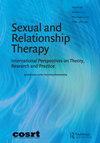更大的正念不影响性满意度,但与较低的关系满意度独立相关
IF 1.4
4区 心理学
Q3 PSYCHOLOGY, CLINICAL
引用次数: 0
摘要
摘要本横断面研究的目的是阐明正念是否与正常关系中的个体的关系和/或性满意度有关,并评估其与其他因素的潜在联系。研究小组包括276名处于恋爱关系中的成年人,他们没有结婚。采用正念注意意识量表(MAAS)、夫妻满意度量表(CSI)、新性满意度量表(NSSS)进行调查。在研究组中,160人(58%)是女性,116人(42%)是男性,62.3%的人已婚,59.8%的人与他们的伴侣自知,67.4%的人与他们的伴侣或伴侣和孩子住在一起。性满意度较高的因素是关系持续时间较短、是男性,而包办婚姻和与伴侣同居的人性满意度较低。非常有趣的是,年龄越大,正念水平越高,关系满意度越低。最后,性和关系满意度密切相关,分别被确定为CSI和NSSS得分的独立因素。有必要进行更全面的纵向研究,评估关系满意度和性满意度,以评估因果关系,并确定可能有利于关系的干预措施。关键词:性行为性活动性满意度正念性伴侣披露声明作者未报告潜在的利益冲突。伦理批准本研究按照赫尔辛基宣言的原则进行。肯特大学临床研究伦理委员会批准(日期:28.05.2020/No: 77083609-100/132)。作者的贡献所有作者都对研究的构思和设计做出了贡献。Selim Arpacioglu、Beyza Arpacioglu和Gozde Avsar负责材料准备、数据收集和分析。手稿的初稿由Selim Arpacioglu, Beyza Arpacioglu和Gozde Avsar撰写,所有作者都对手稿的前几个版本进行了评论。所有作者都阅读并批准了最终的手稿。作者声明在撰写本文期间没有收到任何资金、资助或其他支持。作者简介selim Arpacioglu是İstanbul Altınbaş大学医学院的助理教授。他是CETAD(性教育治疗与研究协会)的注册会员和性治疗师。他从事性治疗师、心理动力治疗师和精神病学家的工作和研究。Zeynep Beyza Arpacioglu是Erenköy研究与培训医院的精神病学家,她同时在Erenköy心理治疗中心担任临床和主管。她完成了CETAD项目的理论课程,对女性的心理和性健康特别感兴趣。Gozde Avsar从事性治疗师、心理动力治疗师和精神病学家的工作和研究。本文章由计算机程序翻译,如有差异,请以英文原文为准。
Greater mindfulness does not influence sexual satisfaction but is independently associated with lower relationship satisfaction
AbstractThe aim of this cross-sectional study was to elucidate whether mindfulness was associated with relationship and/or sexual satisfaction among individuals in a regular relationship and to assess potential links with other factors. The research group consisted of 276 adults who were in a relationship regardless of marriage. Mindful Attention Awareness Scale (MAAS), Couples Satisfaction Index (CSI), New Sexual Satisfaction Scale (NSSS) were applied to all individuals. In the study group, 160 (58%) of the individuals were female, 116 (42%) were male, 62.3% were married, 59.8% were self-acquainted with their partner and 67.4% lived together with their partner or with their partner and children. Factors contributing to greater sexual satisfaction were shorter relationship duration and being a male, while those with an arranged marriage and those cohabiting with their partner had lower sexual satisfaction. Older age and, very interestingly, higher levels of mindfulness were associated with lower levels of relationship satisfaction. Finally, sexual and relationship satisfaction were closely associated and were respectively identified as independent factors for CSI and NSSS scores. There is a need for more comprehensive longitudinal studies evaluating relationship satisfaction and sexual satisfaction to assess causal relationships and to identify interventions that could benefit relationships.Keywords: Sexual behaviorsexual activitysexual satisfactionmindfulnesssexual partners Disclosure statementNo potential conflict of interest was reported by the authors.Ethical approvalThis study was performed in line with the principles of the Declaration of Helsinki. Approval was granted by the Clinical Research Ethics Committee of Kent University (Date: 28.05.2020/No: 77083609-100/132).Authors’ contributionsAll authors contributed to the study conception and design. Material preparation, data collection and analysis were performed by Selim Arpacioglu, Beyza Arpacioglu and Gozde Avsar. The first draft of the manuscript was written by Selim Arpacioglu, Beyza Arpacioglu and Gozde Avsar and all authors commented on previous versions of the manuscript. All authors read and approved the final manuscript.Additional informationFundingThe authors declare that no funds, grants, or other support were received during the preparation of this manuscript.Notes on contributorsSelim ArpaciogluSelim Arpacioglu is an assistant professor at İstanbul Altınbaş University, Faculty of Medicine. He is a certified member and sex therapist of CETAD (Sexual Education Treatment and Research Association). He works and makes researches as sex therapist, psychodynamic therapist, and psychiatrist.Zeynep Beyza ArpaciogluZeynep Beyza Arpacioglu is psychiatrist at Erenköy Research and Training Hospital, she is working as both clinical and supervisor at Erenköy psychotherapy center. She finished theoretic courses of CETAD program and she is specifically interested in women’s mental and sexual health.Gozde AvsarGozde Avsar works and makes researches as sex therapist, psychodynamic therapist, and psychiatrist.
求助全文
通过发布文献求助,成功后即可免费获取论文全文。
去求助
来源期刊

Sexual and Relationship Therapy
PSYCHOLOGY, CLINICAL-
CiteScore
3.80
自引率
9.10%
发文量
37
期刊介绍:
Sexual and Relationship Therapy is a leading independent journal in its field, well established and internationally recognized. It offers an active, multidisciplinary forum for review and debate across the spectrum of sexual and relationship dysfunctions and therapies. The journal presents original research and best practice and is a vehicle for new theory, methodology, and application. Sexual and Relationship Therapy is edited by a respected international team and publishes contributions from around the world. It is the official journal of the British Association for Sexual and Relationship Therapy (BASRT).
 求助内容:
求助内容: 应助结果提醒方式:
应助结果提醒方式:


